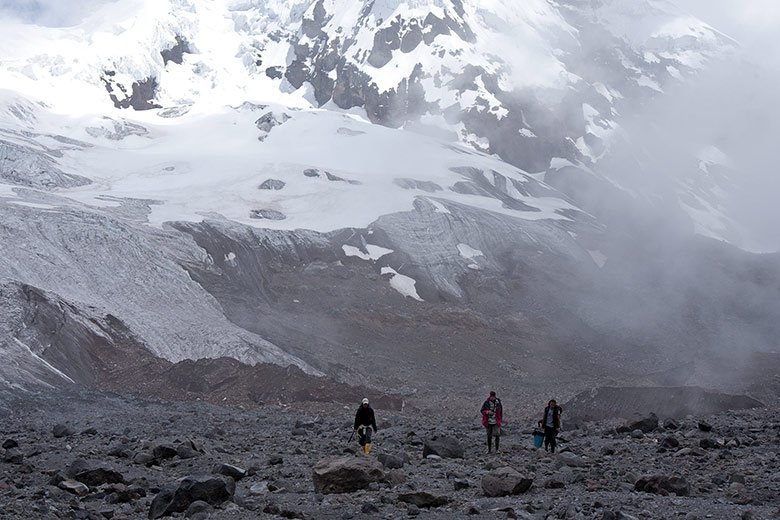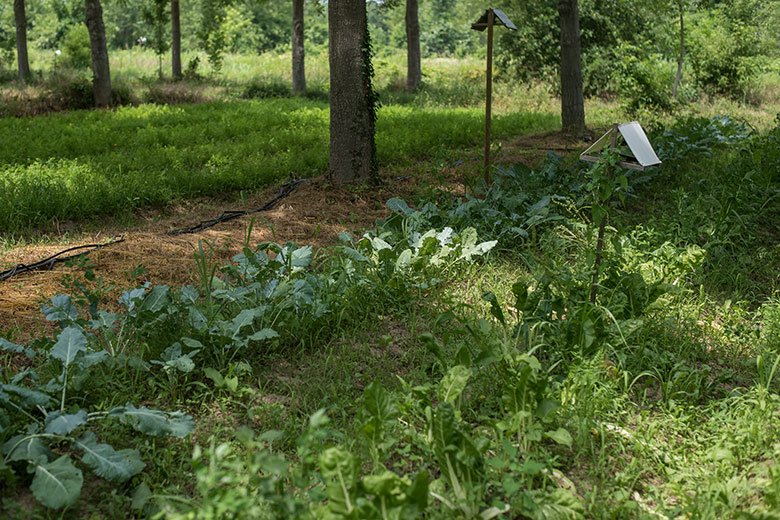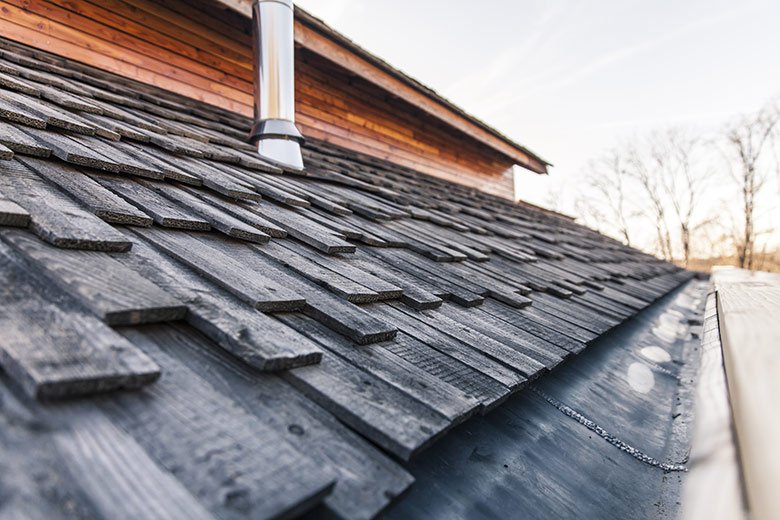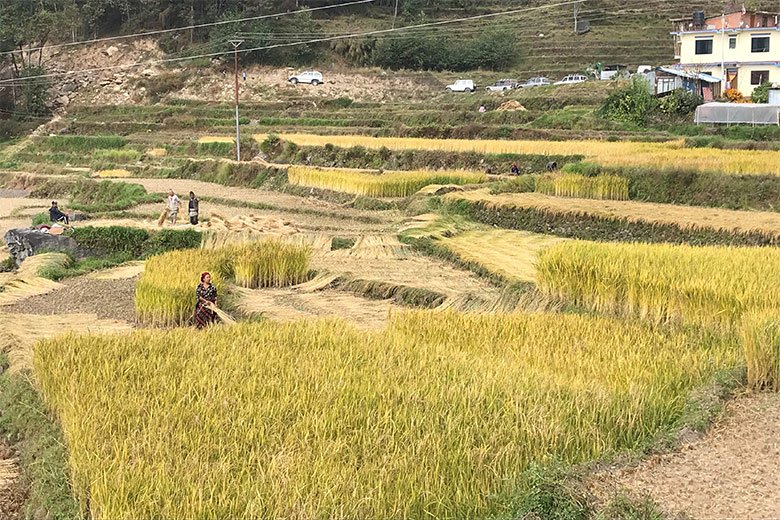Understanding climate change and tackling it... fast!
Tackling climate disruption needs an urgent response! There is a huge amount of work to do: taking the full measure of the problem and its consequences but above all, designing lifestyles and production patterns that are less “climate-challenging.” Philanthropy players are accelerating their engagement on the ground, by contributing support to both scientists and citizens, who sometimes work together in joint projects.
Containing climate warming within a limit of +1.5°C by 2100. The objective of the Paris agreement – a very ambitious one – involves major change, especially for the most developed countries and growing economies. On that front, governments alone can’t meet this target. “The mobilization of civil society is essential in finding and implementing innovative solutions, developing new cooperation and completely transforming our production and consumption models, as well as our lifestyles. Fondation de France firmly believes that foundations can and should play a part to assist and support the movement,” highlights Chief Executive Officer Axelle Davezac.
22 millions
This is the amount of funding Fondation de France and its donor-advised funds have contributed
Accelerate philanthropic commitment
To meet the challenge, the French Foundation Center (CFF) launched the French Coalition of Foundations for the Environment on November 19, 2020. The initiative aims to act as a wake-up call on climate issues and to mobilize foundations and other nonprofits quickly, whatever their size or mission. The coalition, which is supported by eight partners including Fondation de France, will provide a forum for sharing experiences and resources and promoting and disseminating best practices. “ We’re all in this together,” says Marie-Stéphane Maradeix, Managing Director of Fondation Daniel & Nina Carasso, the organization that created the coalition. “We can act on the effects of climate disruption to fix them, but we can also act on their causes. Foundations can work on developing hybrid projects, bringing stakeholders together, funding potentially disruptive solutions, disseminating them in open-source journals and sharing lessons learnt.”
How does climate warming impact health?
Do variations in temperature, especially in times of heatwave, have an impact on a newborn’s birth weight, prematurity and respiratory tract? And what about adults, especially those suffering from asthma? Is there an impact on their respiratory capacity? To shed some light on these questions, the Fondation de France Research mission chose to support Johana Lepeule’s project (Inserm / CNRS), as part of the Health and the Environment Program.
Research informs both citizens and policymakers
The issues of climate change already lie at the heart of many philanthropic initiatives. When it comes to research, which is crucial to inform citizens, it’s particularly important to arrive at policy decisions on the basis of tried and tested scientific data. Fondation BNP Paribas, a Fondation de France donor-advised fund, has made this one of its three priority themes for action. Its Climate & Biodiversity Initiative aims to understand the impact of warming on biodiversity, assess its consequences and help change people’s and organizations’ behavior. In the space of ten years, Fondation BNP Paribas has invested 18 million euros in supporting 27 research teams. It has also raised 400,000 people’s awareness of the problem via conferences and exhibits. The nine winners of its 2019 call for projects work in international and multidisciplinary teams.
 Life Without Ice, a project that examines the consequences of glacier extinction on biodiversity and the world’s populations, won the Climate & Biodiversity Initiative award from Fondation BNP Paribas. © IRD-Olivier Dangles
Life Without Ice, a project that examines the consequences of glacier extinction on biodiversity and the world’s populations, won the Climate & Biodiversity Initiative award from Fondation BNP Paribas. © IRD-Olivier DanglesFrom nature... to agriculture
One of these is Life Without Ice, an Institut de Recherche pour le Développement (Institute for Research Development) project, which examines the consequences of glacier extinction for biodiversity and the world’s populations. Another is Ghent University’s Cambio project, in Belgium – which aims to use reforesting as a way of tackling climate change, by identifying the most adaptable and resistant trees in the face of extreme events. “These research projects are not just intellectual exercises, they also represent a responsible approach,” explains Philippe Gillet, president of the program’s scientific committee. The research projects selected must match citizens’ expectations. They must also pave the way towards solutions and political decisions.”sité : recréer un lien durable avec la nature
Since 2011, Fondation de France has been leading a collaborative approach in the Agroforestry Program. Its starting assumption was that agroforestry, which combines trees and crops in the same plot, could be a way for agriculture to combat climate disruption. In less than ten years, the program has funded 81 projects. They include the research conducted by Guillaume Blanchet in the UMR-Systeme (Joint Research Unit) [2] on the resilience of areas cultivated in agroforestry in the face of climate and water stress (hotter and drier weather). Observations are first made in an experimental farm located in the southwest of France, which reproduces these weather conditions, then in a lab, thanks to the numerical simulations that extrapolate field data. The outcome? Expected results will enable farmers, who are considering these new practices, to rely on robust data.
 Research in agroforestry helps us understand the interactions between trees, microclimate and vegetable farming.© Thomas Salva
Research in agroforestry helps us understand the interactions between trees, microclimate and vegetable farming.© Thomas Salva A collaborative movement
The time to act is now. The climate issue is transversal by nature. What applies to agriculture also applies to other fields: housing (according to ADEME, in France, the building industry consumes around half of all energy and generates 20% of greenhouse gases)[3], transport (14% of all greenhouse gas emissions)[3], industry, commerce and so on. Not one player in any industry sector or social field can avoid major operational transformation. And to that end, it is essential that citizens – who are also consumers and workers – be engaged, organized and that they innovate and experiment with collaborative solutions.
This open, participative philosophy guides the many projects that incorporate climate in the various Fondation de France programs. For example, the Housing program chose to work with Energies Solidaires, a nonprofit that fights against both poverty and climate warming. In the Île-de-France region: it organizes renovation work in the homes of low-income households, by involving families, volunteers and professionals. The outcome? A better quality of life, reduced energy consumption and lower greenhouse gas emissions. And also the realization that everyone can act, at their own level.
 Example of roofing insulation with environmentally-friendly materials. © Thomas Salva
Example of roofing insulation with environmentally-friendly materials. © Thomas SalvaTaking action together, now
This is also the case of the Ecological Transition Program, which draws on these transformations as leverage for transforming society, towards increased citizen participation and solidarity. “Civil society is ready to get involved: since 2016, we’ve been able to support almost 200 projects,” notes Laetitia Bertholet, head of the Environment programs at Fondation de France. “Climate is rarely an isolated issue. It’s at the heart of projects, it’s associated with biodiversity, local development, education on responsible consumption ... because everything links to everything. For example, we support the Vent d’Ouest collective in Caen: this is a citizen group initiative, where members think through how their neighborhood could move towards more sustainable ways of doing things. And then there’s Coopere, in the southwest of France, whose project aims to add to the momentum created by the Citizens’ Convention for Climate in France. These residents engage in debates and organize themselves to adopt the measures suggested by the Convention, locally, without waiting for solutions that come from on high.”
Fondation 2019: economic research on the front line
“Economic science should be very closely linked to ecology, but its fundamental tenets and measurement tools are based on betting on infinite growth on a finite planet!” This paradox led Romain Ferrari to create Fondation 2019. Its mission is to list, develop and test new economic measurement tools, which take into account environmental and social impact. Fondation 2019 supports research in partnership with universities, research centers and specialized agencies. The founder insists that “the objective is for the long term. The idea is that these eco-compatible tools will one day be used to guide choices, by modifying taxation regimes for instance, or in companies’ and public entities’ accounting practices, for true transparency on their financial results.” Here’s an example of ongoing work: a “circular sales tax” to promote low-impact products and services, which has been debated at the French National Assembly and developed in partnership with ADEME.
A different rebuild after a disaster
Citizen involvement is all the more precious in rebuild situations in the wake of a natural disaster. How can we avoid repeating past mistakes, and adopt more sustainable lifestyles? Fondation de France also assists Thangpal valley residents, in Nepal, badly hit by the 2015 earthquake. Once the emergency has been dealt with (healthcare, shelter), it’s time for families to return to their jobs and trades. “They want to turn to more resilient production models in the face of disasters, especially climate-related,” explains Karine Meaux, head of the Emergencies Program. “With the transition to organic agriculture, lower consumption of chemicals and water, reforestation that aims to stabilize topsoils and capture carbon and an ambitious program of training and awareness raising on climate change.”
 Five years after the Nepal earthquakes, agroecology is already at the heart of Fondation de France’s projects: it now serves as a model for development, combating climate change and risk prevention. © D.R
Five years after the Nepal earthquakes, agroecology is already at the heart of Fondation de France’s projects: it now serves as a model for development, combating climate change and risk prevention. © D.RA bridge between researchers and citizens
Understanding thanks to research on the one hand and experimenting thanks to citizens on the other hand – how about decompartmentalizing things? Experience has shown that scientific results alone have not been enough to trigger sustainable transformation, and that initiatives which did not rely on scientific validation were vulnerable. Hence the idea of “participative research,” which suggests bridging these two worlds. The action-research program on coastlines, operated by Fondation de France since 2011, forms part of that movement. Because of climate warming, ocean acidification and the rise in sea levels, coasts and marine environments are first among the victims of the climate crisis. Coastal areas are also highly populated, and very attractive regions, with strong demographic, economic and tourism pressure. All the projects supported by the program are directed to this cooperation with scientists of different disciplines and citizens. For example, PHENOMER[4] invites the general public to notify the platform of emerging problems relating to micro-algae (such as water color, abundant foam and abnormal mortality in various species). The data collated increases observation capacity and scientific analysis by a factor of ten, to better understand the phenomenon. Another project, ACID-REEFS monitors the response of coral reefs to ocean acidification. These reefs play an essential part in the environmental and economic equilibrium of French Polynesia. From inception, the project combined six French and international research centers: Institut des Récifs Coralliens du Pacifique (Pacific Coral Reefs Institute) and two French Polynesian nonprofits. To understand issues of biodiversity and human organization, the aim is to propose a plan of action for small Pacific Island countries. Understanding and taking action ... fast.
Sustainable Development Goals: “reading notes” for philanthropists
The United Nations set out 17 Sustainable Development Goals (SDGs), as the central element of its 2030 Agenda. SDGs cover the entirety of all development issues in every country, such as climate, biodiversity, poverty, gender equality, economic prosperity, education, etc. All entities – including countries, local authorities, companies and nonprofits – share a joint language with which to monitor the ecological and solidarity transition. Fondation de France has turned this into a roadmap: since 2019, some 10,000 charitable projects supported by Fondation de France and its donor-advised funds are measured against their contribution to one or several SDGs.
[1] The coalition is supported by 8 partners: Fondation Daniel et Nina Carasso, Fondation de France, Fondation Groupe EDF, Fondation BNP-Paribas, Fondation Chanel, Fonds Decitre, Fonds de Dotation Vital Strategies and Donors and Foundations Networks in Europe (DAFNE).
[2] The UMR System operates under the aegis of Cirad, Inra, Montpellier SupAgro and CIHEAM-IAMM.
[3] Sources: https://www.facilogi.com/blog/adapter-le-logement-au-rechauffement-climatique/
http://les.cahiers-developpement-durable.be/outils/transports-climat/
[4] PHENOMER is an entity managed by Ifremer and its scientific partners (Roscoff Biological Base, IUEM-LEMAR) as well as its non-profit partners (Cap vers la Nature).
TO FIND OUT MORE

